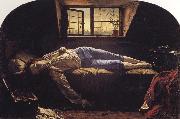Wholesale Oil Painting No Minimum |
|||||||||||
|
|
|||||||||||

|
|||||||||||
|
|
|
||||||||
Henry WallisBritish 1830-1916 1916). English painter, writer and collector. He first studied at F. S. Cary academy and in 1848 entered the Royal Academy Schools, London. He is also thought to have trained in Paris at some time in the late 1840s or early 1850s, first in Charles Gleyre atelier and subsequently at the Ecole des Beaux-Arts. He specialized in portraits of literary figures and scenes from the lives of past writers, as in Dr Johnson at Cave, the Publisher (1854; untraced). His first great success was the Death of Chatterton (London, Tate), which he exhibited at the Royal Academy in 1856. The impoverished late 18th-century poet Thomas Chatterton, who while still in his teens had poisoned himself in despair, was a romantic hero for many young and struggling artists in Wallis day. He depicted the poet dead in his London garret, the floor strewn with torn fragments of manuscript and, tellingly, an empty phial near his hand. The painting was universally praised, not least by John Ruskin who described it as faultless and wonderful, advising visitors to examine it well, inch by inch. Although Wallis was only loosely connected with the Pre-Raphaelite movement, his method and style in Chatterton reveal the importance of that connection: the vibrant colours and careful build-up of symbolic detail are typical Pre-Raphaelite concerns. The success of Chatterton was such that, when exhibited in Manchester the following year, it was protected from the jostling crowds by a policeman. It was bought by another artist, Augustus |
||||||||
|
|
||||||||
Chatterton
Chatterton Painting ID:: 28265 |
1855-6
Oil on canvas 60.2 x 91.2 cm
(23 3/4 x 36 in)
Tate Gallery London (mk63) 1855-6 Oil on canvas 60.2 x 91.2 cm (23 3/4 x 36 in) Tate Gallery London (mk63) |
|||||||
|
CONTACT US |

